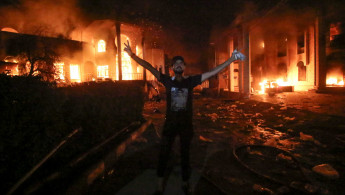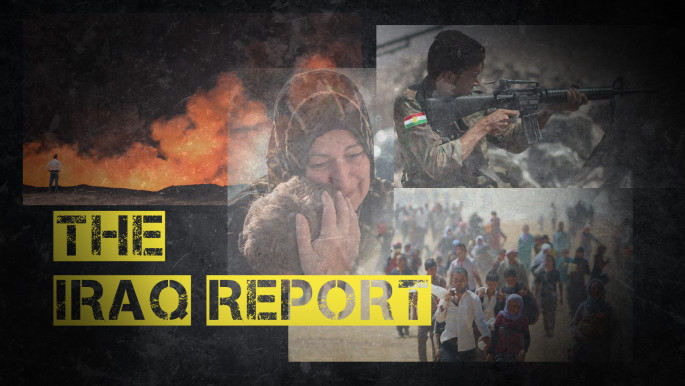The Iraq Report: A year of instability, chaos and corruption
Although it has been more than a year since former Prime Minister Haider al-Abadi announced the final defeat of the Islamic State group in Iraq and pledged stability, reconstruction and long-overdue redevelopment, Iraq is as unstable, chaotic and corrupt as it has ever been.
While Abadi has departed and has finally been replaced by Adel Abdul Mahdi, a Shia Islamist-cum-Baathist-cum-Communist, there is little hope for an imediate end to Iraq's disorder. Iran is still calling most of the shots and leveraging its relationships to strengthen its position versus the United States.
Meanwhile, a weak government in Baghdad cannot (or will not) tackle the rampant corruption that has led to an outpouring of popular dissent, and the country's leaders are a long way from challenging Tehran's dominance.
With 2018 now coming to a close, a number of familiar patterns can be discerned and could indicate what we might expect in 2019.
Politicians wrangling and jockeying for power
With Abadi's failure to win the election in May this year, and his subsequent failure to garner enough support from rival parliamentary blocs to maintain his position, his departure was a long, excruciating process that arguably has not yet even concluded.
 |
Sadr managed to win just 54 seats of a total 329 - hardly the storming success that was feted in the press |  |
In fairness to the former premier, no single party won the elections outright, with the largest number of seats going to Shia Islamist Muqtada al-Sadr and his Sairoun bloc making common cause with communists and others.
Even then, Sadr managed to win just 54 seats of a total 329 - hardly the storming success that was feted in the press. With a turnout of 44.5 percent - the lowest ever in Iraq's short-lived democracy - this result was more symptomatic of a lethargic and frustrated population rather than any popularity on Sadr's part.
Although Prime Minister Abdul Mahdi was sworn into office in late October - almost half a year after the elections took place - he has yet to navigate the treacherous waters of the Iraqi parliament, who have blocked several of his proposed ministerial appointees. Several ministries currently stand without leadership, including the powerful and influential defence and interior ministries.
Twitter Post
|
Mahdi was very much a compromise candidate between the various blocs, and it seems that parliamentary groups are keen on reminding him of his relative powerlessness at every given turn.
The Conquest Alliance, the political branch of the Iran-backed paramilitary Popular Mobilisation Forces (PMF), has been growing in influence and power as it increasingly weighs in on all political decisions. Apart from coming second in the elections, the PMF also acts as the military muscle of the political consortium of pro-Iran Shia militant factions.
Few, including Sadr, would dare to openly oppose the Conquest Alliance's agenda as they have the political, military and economic strength to cause their opponents some serious harm.
In fact, and with the Conquest Alliance serving as their face and voice in parliament, the PMF have now wrangled several concessions from the apparent political masters of the military.
Firstly, parliament approved a government motion under Abadi to formalise the PMF as a separate branch of the Iraqi armed forces. This would technically put them within the chain of command, answerable to the prime minister's office. In reality, and as will be expanded upon further, they prefer to take their orders from Iran and were fighting in Syria, despite Abadi's orders for them not to engage.
Secondly, Iraqi law forbids militants from taking part in political activities. However, this proved to be no barrier to Hadi al-Ameri who, as leader of the militant Badr Organisation, also led the Conquest Alliance to second place in May's poll. Again, the kind of political, economic and military power he can draw upon to impose his will on the electorate is more powerful than the law itself.
Of course, he was only the most prominent out of a number of militants who temporarily donned suits to run for office.
Finally, and most recently, parliament passed a bill that granted PMF fighters equal pay to their army counterparts. This move is likely to stir animosity between the two sister arms, as the army sees itself as being a more professional, valuable and nationally representative force than the PMF which is viewed as a more obvious proxy for Iranian ambitions.
Iran's grip on Iraq remains tight
Despite Sadr's often prominently reported displays of anti-Iranian interventionism, today's government - like the administrations before it - offer up a pastiche of politicians who are friendly to Iran and offer no resistance to its goals that come at Iraq's expense.
Prime Minister Mahdi was once a communist and a Baathist, but has been a staunch Shia Islamist working at the higher echelons of power within the Islamic Supreme Council for Iraq (ISCI). Before it rebranded, ISCI was once known as the Supreme Council for the Islamic Revolution in Iraq (SCIRI), and adopted a Khomeinist ideology seeking to spread Iran's theocratic ideals to Iraq and beyond.
During the reign of Saddam Hussein, SCIRI and many other Shia Islamist groups received succour from Iran which is now cashing in on decades of refuge, political, economic and military support.
Iraq's new parliamentary speaker and president are little more detached from the Iranian sphere of influence. Speaker Mohammed al-Halbusi is a pro-Iran Sunni Arab who has worked closely with factions within the PMF, and his selection was openly praised by senior figures in the Iranian government.
 |
Aside from all the political influence, Tehran's religious and military influence is significant with the PMF acting as its most useful proxy |  |
President Barham Salih is a Kurd hailing from the Patriotic Union of Kurdistan (PUK) party, another group closely linked to Iran. When Abadi deployed troops last year to forcefully wrest Kirkuk and hundreds of square kilometres out of Kurdish hands following the botched Kurdish independence referendum, the PUK stood with him and Iran and stood aside as former Kurdistan Regional President Barzani's forces were swept aside in days.
In other words, the PUK - a separatist political party - stood aside as a result of Iranian demands to scuttle any hope of Kurdish independence.
Aside from all the political influence, Tehran's religious and military influence is significant with the PMF acting as its most useful proxy. Apart from all the concessions it received from parliament regarding salary and formal recognition, the PMF is now also demanding a formal border security role, according to Reuters. With the PMF actively conducting combat operations in Syria, having border control duties would enhance Iran's already considerable ability to penetrate Iraq's permeable borders and sovereign territory.
More protests and unrest can be expected
Civil unrest is nothing unusual in Iraq, as years of internecine warfare has proven. However, the government has found it almost impossible to quell a breakout of popular protests since last summer in its Shia heartland in Basra, Nasiriyyah and other southern governorates little affected by the war on IS.
While much of the discontent was stifled by the not-so-subtle prodding of sectarian Shia Islamist politicians such as Abadi's predecessor, Nouri al-Maliki, who framed the IS menace as a Sunni threat against the Shia, this can no longer be drawn upon now that IS has been ostensibly defeated.
Despite having more than 15 years to solve the problem they had long blamed on Baathist incompetence and corruption, the present crop of Iraqi political leaders have yet to do anything substantial about Iraq's electric grid stability and heavily polluted water.
 |
Dealing with the heat can become excruciating once the fasting in the Islamic holy month of Ramadan is taken into account |  |
In fact, Iraq - one of the most energy-rich countries on the planet - imports electricity from neighbouring Iran, incensing the population with activists quick to call corruption. When even this source of power was temporarily halted, with Iraqis' access to electricity sometimes limited to just four hours a day, the population erupted with fury.
Iraq's summers are scorching hot, and without electricity it is difficult to operate air conditioning units or fans. Dealing with the heat can become excruciating once the fasting in the Islamic holy month of Ramadan is taken into account.
Adding to the woes of the people is the chronic water pollution, particularly in Basra. Basra - once dubbed the "Iraqi Venice" due to its beautiful waterways and scenic vistas - suffered from widespread water poisoning, leading to 100,000 people being admitted to hospital as a cholera epidemic broke out.
An Iraqi football team were among the casualties, as was an official from the European Union.
The government's response has been brutal, with police units and pro-Iran militants using extreme force, including lethal shootings. Several key activists were killed, with a number of women targeted for raising their voices in protest, offending the ultraconservative Shia militant groups.
However, despite the violence, protests have continued unabated with demonstrators even emulating Paris' gilets jaunes protesters by donning the iconic high-visibility vests to draw international visibility to their plight.
With matters getting worse and not better, we can only expect this unrest to continue into the new year, with a potential violent flare-up when summer temperatures take tempers to their boiling points.






 Follow the Middle East's top stories in English at The New Arab on Google News
Follow the Middle East's top stories in English at The New Arab on Google News


